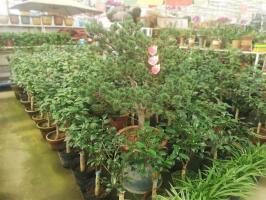How to Kill Ground Bees in Potted Plant
Ground bees can be a problem for gardeners, especially when they decide to make their homes in potted plants. Not only can their activity be disruptive to the growth of the plants, but their stings can also be painful and cause allergic reactions. In this article, we will discuss how to effectively kill ground bees in potted plants.
Identifying Ground Bees
Before attempting to kill ground bees in your potted plants, it is essential to identify the species correctly. Ground bees are typically small or medium-sized insects, ranging from ? to 1 inch in size. They are usually solitary, but some species live in colonies. Ground bees can be identified by their fuzziness and bands of yellow or orange on their abdomens.
Assessing the Risk
Before deciding to kill ground bees, you need to assess the risk they pose to the people around the plants. If the bees are not aggressive and are not causing any damage to the plant, it may be best to leave them alone. However, if the bees are causing damage to your plant or are aggressive, it is time to take action.
Precautions Before Killing Ground Bees
Killing ground bees can be dangerous, and it is essential to take precautions to avoid getting stung. Before attempting to kill the bees, wear long sleeves, pants, gloves, and other protective clothing. Cover your face with a beekeeper hat or veil, and wear shoes that cover your toes. It is also best to kill the bees at night when they are less active.
Killing Ground Bees in Potted Plants
To kill the ground bees in your potted plants, you need to follow the right method. The most effective way to kill them is to use an insecticide. Look for an insecticide that is labeled for ground bees, and follow the instructions carefully. The insecticide should be applied directly to the nest entrances or the bees' flight path. Cover the entire potted plant with a cloth to prevent the bees from escaping while you spray the insecticide.
Preventing Future Ground Bee Infestations
To prevent future ground bee infestations in your potted plants, you can take several measures. First, avoid overwatering your plants, as damp soil can attract bees. Second, keep your plants well-trimmed and free from weeds, as these can provide a nesting ground for bees. You can also use beneficial insects that prey on ground bees, such as parasitic wasps and robber flies, to keep them at bay.
Conclusion
Killing ground bees in potted plants can be a challenging task, but it is possible with the right approach. Remember to identify the species correctly, assess the risk, take precautions, apply the insecticide effectively, and take measures to prevent future infestations. With these steps, you can keep your potted plants healthy and bee-free.

 how many times do yo...
how many times do yo... how many planted tre...
how many planted tre... how many pine trees ...
how many pine trees ... how many pecan trees...
how many pecan trees... how many plants comp...
how many plants comp... how many plants can ...
how many plants can ... how many plants and ...
how many plants and ... how many pepper plan...
how many pepper plan...
































